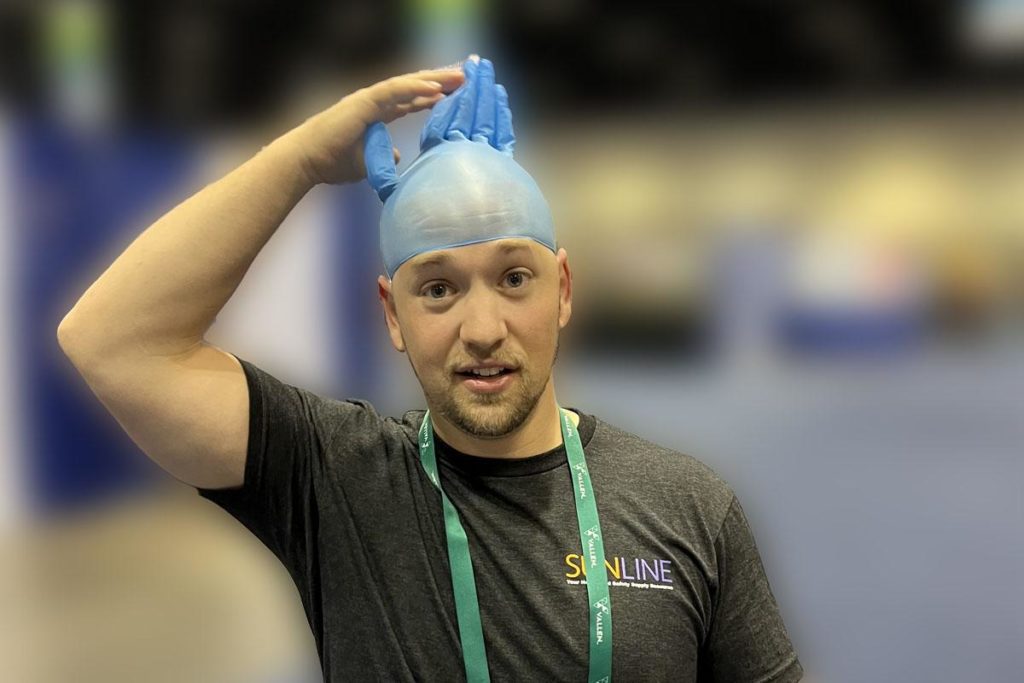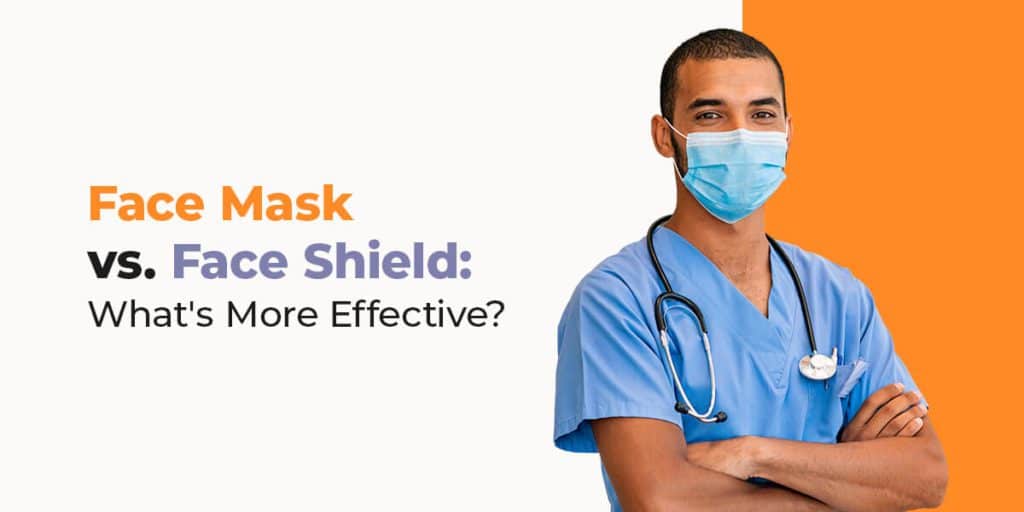
Face Mask vs. Face Shield: What’s More Effective?
Having trusted protection for healthcare, commercial, industrial and other busy environments can be critical to protecting employees’ and visitors’ health. Face shields and face masks are standard solutions to enhance worker safety at a work site or facility. This personal protective equipment serves a critical purpose across industries, and you may be wondering which option works best for face protection.
Can you wear a face shield instead of a mask to protect yourself against contaminants, viruses, chemicals and other potentially harmful airborne substances? The answer primarily depends on your applications and appropriate uses for the situation. Face shield protection, surgical masks or face shield with mask options are all available for users, but each works best in different applications. Read on to explore face shield vs. face mask options and find the ideal choice for your work site.
What Is a Face Shield?
A plastic face shield covers the entire front and sides of your face to protect it from direct-splash contact. It is ideal for guarding against airborne contaminants, liquid chemicals, respiratory droplets and other hazardous chemicals. It will not interfere with your vision or hearing, making it convenient for many types of applications.
Most face shields fasten with elastic, adjustable headbands for a comfortable and secure fit. They have ample space between the visor and the face to keep you comfortable and provide room for glasses, goggles or face masks underneath.
There are two primary types of face shields for specific uses.
Medical Face Shields
Shatterproof and transparent, these face shields are lightweight but provide full-face coverage for the user. The medical-grade face shield protection is ideal for hospitals, healthcare facilities and public environments where airborne pathogens may be present. Many come with a hinged design, so you can flip them up or down for convenient use.
Direct-Splash Face Shields
Direct-splash face shields can protect from airborne contaminants in public spaces, chemicals in laboratory settings and other similar situations. They are usually available with an anti-fog coating to provide complete visibility during continuous wear. They can also rotate 180 degrees if you need to remove them momentarily.
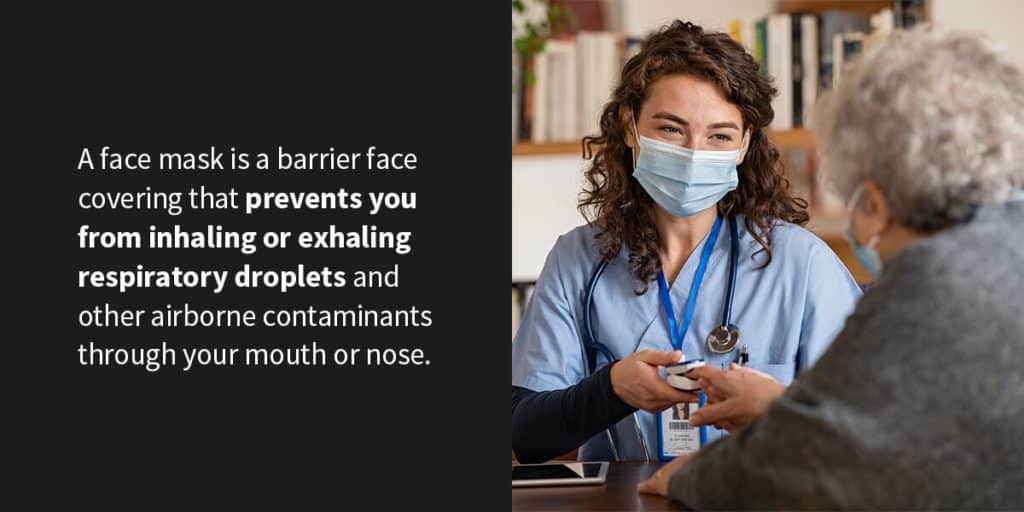
Face Masks and Their Types
A face mask is a barrier face covering that prevents you from inhaling or exhaling respiratory droplets and other airborne contaminants through your mouth or nose. These coverings can come in several different materials and thicknesses, depending on their applications. Some are for general use, while others are appropriate for medical-grade protection, even though masks are not medical devices.
Surgical
In many medical applications, this type of mask is common. To avoid breathing in germs and allergens, you can also use surgical masks for safety in public places during cold, flu and allergy seasons.
Dental, isolation, surgical operations and other medical procedures regularly implement surgical masks to prevent the spread of sprays, splashes and large-particle droplets that could contain viruses or bacteria. These masks can also help prevent the wearer’s exposure to airborne contaminants and bacteria in the environment.
Made from nonwoven fabrics through a melt-blowing process, these masks fall under 21 CFR 878.4040 regulatory standards from the CDC. While they can provide adequate protection in some cases, their loose fit means that they cannot fully protect the wearer from respiratory droplets and other airborne hazards.
N95 Respirator
As a multipurpose face mask, the N95 respirator provides optimal protection because of its close fit and highly effective filtration of airborne particles. Also known as professional respirators, these masks can minimize the wearer’s exposure to airborne droplets containing bacteria or viruses.
N95 respirators are ideal in healthcare settings, where a tight seal of protection against airborne particles is vital for workers’ daily safety.
Cloth Masks
Because they come from many different manufacturers and do not have to meet any regulations, general cloth face masks vary widely in quality and protection. Depending on their design, they may not fully filter air or serve as an adequate barrier, and are not medical devices. They are appropriate for public use, but it’s essential to consult CDC recommendations to find the safest option.
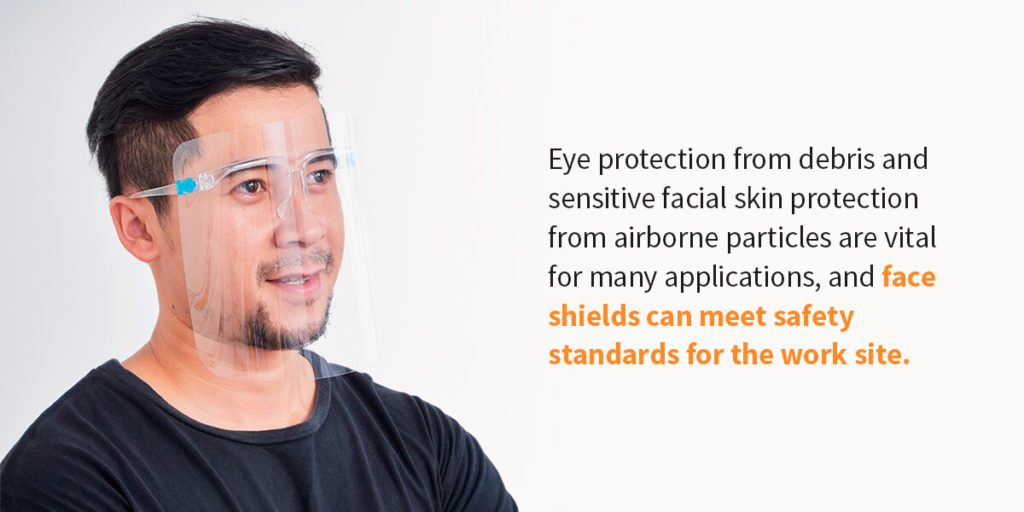
What Are Face Shields Used For?
In many industries, face shields protect workers in areas where debris, chemicals and contaminants might be flying through the air. Eye protection from debris and sensitive facial skin protection from airborne particles are vital for many applications, and face shields can meet safety standards for the work site.
Industry Uses
Face shields may be part of a workplace injury prevention program, helping protect the face from impact hazards. OSHA does not classify face shields as adequate protection from flying hazards by themselves, but they can be highly effective coupled with other protective gear such as safety glasses. These double layers of protection can guard your eyes against impact from objects that could get underneath your face shield or hit it with excessive force.
If workers use chemicals or other hazardous materials, face shields can also help provide adequate protection from these risks.
Laboratory Uses
Face shields in laboratories can help protect your face from heat burns, caustic chemicals and other hazards that may be present. As workers handle potentially dangerous experiments, sharp tools and other materials, a face shield can provide optimized protection for their entire face. The full coverage it offers without impeding vision is beneficial for laboratory requirements.
Medical Uses
In the medical field, face shields can provide additional barrier protection for the facial area, preventing contaminating respiratory droplets, fluids or other hazardous materials from reaching a healthcare provider. This solution is critical to protecting users as they work with possibly contagious patients or shielding patients from potential viruses or bacteria their health provider may carry.
Widespread use across dental, surgical, orthodontal, specialty and general practitioner services helps medical professionals maintain safety for themselves and their patients.
What Are Face Masks For?
Across various industries, face masks fulfill several critical purposes for worker protection and operational requirements. Many people use them in public life and in industry-specific settings to protect themselves from various airborne health risks.
Healthcare Infection Control
Many different airborne pathogens can risk workers’ safety in healthcare settings. Face masks protect wearers’ noses and mouths, helping block dangerous contaminants and preventing workers with contagious illnesses from spreading them. To help control infection rates in high-risk settings, people can also wear face masks for protection from the community’s spread of illnesses.
Dusty Industrial Environments
In highly dusty environments, such as manufacturing, face mask protection can prevent workers from inhaling debris. Some manufacturing settings process wood, metal and other materials that can send high levels of dust and debris into the air around workers. Excessive dust and manufacturing byproducts can cause permanent damage to the lungs, so adequate protection is vital for workers who may be in these environments for hours every day.
Effective face masks block debris from the wearer’s nose and mouth, protecting them from inhaling any harmful substances into their lungs.
Laboratories
In laboratory settings, dangerous airborne chemical fumes, pathogens and other potentially harmful materials may be circulating throughout the air. Face masks are standard in these fields to protect workers on the job. This equipment can prevent them from inhaling liquid chemicals, debris or bacteria and viruses in the air.
Pros and Cons of Face Shields
When using face shields, wearers need to be aware of some of the advantages and disadvantages of the equipment. In any situation, understanding the correct applications for face fields shields is critical for effective and safe use.
Face Shield Advantages
For many situations, face shields offer a highly effective method of protection for wearers. Here are some of the benefits of the equipment.
- Visibility: With a face shield that prevents fogging, the wearer and other people in the same environment can see more clearly to handle day-to-day operations.
- Clearer speech: When talking through a face shield, wearers’ voices come through more clearly to optimize communication. For those with a hearing impairment, face shields also allow them to see the speaker’s mouth better.
- Comfort: A face shield has minimum contact with the face, allowing increased comfort even after long-term use. It’s also more breathable because it does not cover the mouth and nose tightly.
- Reusability: Plastic face shields can undergo intensive cleaning and disinfecting processes for safe reuse, decreasing supply costs and constraints.
Face Shield Disadvantages
At the same time, face shields provide some notable disadvantages that make them unfit for some applications.
- Insufficient respiratory protection against pathogens: Some studies have shown face shields provide less security than face masks against virus and bacteria particles in the air.
- Fogging: Face shields can easily fog up as the wearer breathes, impeding visibility and potentially being a hazard. Many face shields offer anti-fog treatments to help with this issue, but they may still pose problems for some users.
- Glare: While wearing a face shield, wearers may have to navigate increased glare, which can cause eye strain or impede work.
Pros and Cons of Face Masks
Face masks are versatile, easy to use and convenient for many different medical and industrial requirements. They offer some distinct benefits but also have some disadvantages for certain situations. You’ll need to evaluate your specific requirements and environment to decide what’s best for your needs.
Face Mask Advantages
Users choose face masks for many reasons and in many different settings.
- Better respiratory protection: This product provides optimized respiratory protection and helps prevent users from inhaling pathogens.
- Fit: Face masks’secure fit covers the entire mouth and nose, providing enhanced protection for users.
- Filtering: Depending on the type of mask, this equipment can efficiently filter out pathogens and other dangerous airborne contaminants, providing added protection for users.
- Standards: This product must meet stringent specifications to ensure safety and effectiveness, maintaining a quality standard that will be consistent across manufacturers.
Face Mask Disadvantages
While face masks can address many needs for protection from airborne materials, some drawbacks make them inconvenient in specific circumstances. If your operations require face masks for worker safety, it’s essential to address these potential issues proactively.
- Single-use: For medical-grade applications, face masks are only effective for one use. After a single use, regulations stipulate that the wearer must discard a face mask and get a new one.
- Supply constraints: Because they are vital for several medical and industrial applications and are single-use, users need to optimize supply and navigate high demand. Generally, face shields are much more widely available for purchase.
- Breathability: Face masks can cause complications for those with difficulty breathing, which means individuals with specific health conditions may not be able to wear them for long periods.
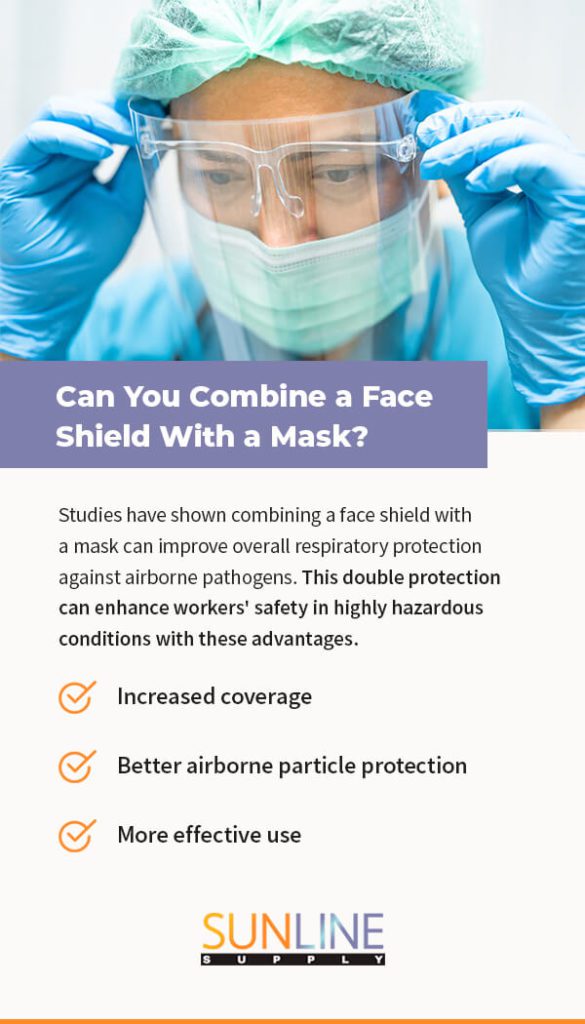
Can You Combine a Face Shield With a Mask?
Do you primarily need a face shield to protect from flying objects? In that case, a face mask will probably not be necessary because it can’t offer much additional protection from a blunt impact. However, if you require protection against smaller particles in the air, combining the two types of equipment can be highly beneficial.
Studies have shown combining a face shield with a mask can improve overall respiratory protection against airborne pathogens. Face masks and face shields each provide partial protection against pathogens, creating a barrier against harmful airborne particles.
This double protection can enhance workers’ safety in highly hazardous conditions with these advantages.
- Increased coverage: A face mask more thoroughly covers your mouth and nose, while a face shield covers your eyes. Together, the equipment provides complete coverage for your face.
- Better airborne particle protection: A face shield can act as a first-level barrier against liquid droplets, and the mask can filter out contaminants that get underneath the face shield.
- More effective use: Masks are sometimes challenging to wear properly for complete protection, but face shields are relatively easy to wear correctly. A face shield and mask together help users get more protection.
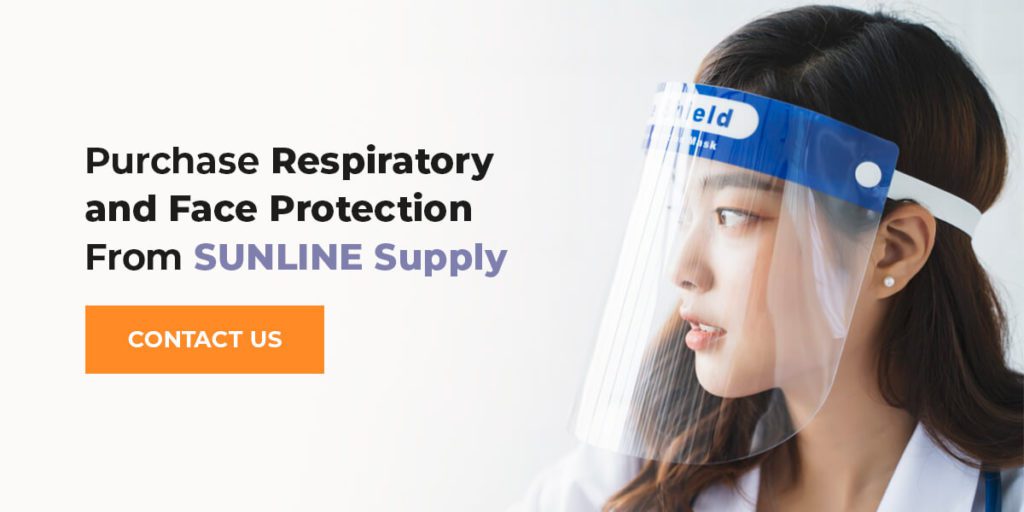
Purchase Respiratory and Face Protection From SUNLINE Supply
At SUNLINE Supply, we offer trusted solutions for your operational requirements. We sell PPE in bulk to help protect workplaces across industries from the risk of health hazards. As a company, we only supply the best-quality PPE to offer maximum protection to your employees. We have 24/7 sales availability to discuss your applications, answer questions and help you find the best options. With bulk purchase options and cost-effective pricing, we can help you get the best-value PPE.
Regardless of your bulk purchasing supply needs, we’re here to fulfill them. We prioritize fast and effective shipping to supply your organization as quickly as possible. Our quick turnaround times and quality services help make your supply process convenient and fast.
Work with us to get trusted face masks and equipment, including shields and goggles, for your applications. For more information, contact us online or call us at 866-607-0515.
